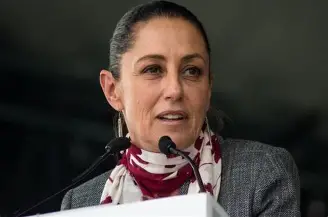Mexico has been thrust into a national reckoning on sexual violence following the public groping of President Claudia Sheinbaum in Mexico City, an incident that has prompted swift political action and reignited debate over how best to tackle abuse that remains widespread across the country.
The assault, captured on video, showed a seemingly intoxicated man attempting to kiss the president and reaching for her breasts as she walked through the capital. The footage provoked outrage across Mexico, with many women noting that if even the head of state could be subjected to such behaviour, it underscored the vulnerability faced daily by millions of women.
In response, Citlalli Hernández, Mexico’s secretary for women, unveiled a presidential plan designed to confront sexual abuse more forcefully. The proposals include ensuring prison sentences for sexual assault across all 32 states, encouraging women to report incidents, and providing training for prosecutors, police officers and other officials on how to handle cases appropriately. A nationwide awareness campaign is also planned, targeting schools, workplaces, public transport and community spaces.
“We want to tell all Mexican women, girls, young women, and women in general that you are not alone, that when you experience any type of violence, it is important to report it,” Hernández said. “Know that today there is a president who protects you.”
The urgency of the plan reflects the scale of the problem. According to Mexico’s national statistics agency, seven in ten women and girls aged 15 and above have experienced at least one form of violence in their lifetime, ranging from psychological abuse to sexual assault. This year alone, 25,000 complaints of sexual harassment have been filed nationwide. Such abuse often escalates into more severe violence: an average of ten women are murdered every day in Mexico, with more than 500 femicides recorded in the first six months of the year.
Congresswoman Rocio Abreu, from Sheinbaum’s Morena party, said the president’s experience mirrored that of countless women. “The president is just another one of us who have experienced harassment, political violence, physical violence, sexual violence, economic violence. There is a whole range of violence against women … And none of us are exempt.”
A central element of Sheinbaum’s plan is to ensure sexual assault is classified as a criminal offence in every state, aligning local penal codes with federal law, which stipulates six to ten years’ imprisonment for violent sexual abuse against vulnerable people or minors. Senator Martha Lucía Mícher, also of Morena, confirmed that the senate would review state legislation. “It’s a crime committed against the daughters of judges, their sisters, their wives,” she said, stressing the need for uniformity in legal protections.
Mícher emphasised, however, that legislation alone would not suffice. “You have to classify the crime as a serious offence. You also work with men. You also empower women. You also conduct awareness campaigns. You also train public officials, police officers, government officials and judges. And you also do great work with the community.”
Despite the government’s pledges, scepticism remains among women and activists who argue that promises of reform have too often failed to deliver meaningful change. “It’s been too many years of fighting and too many years of this movement and there hasn’t been a difference,” said Itzayana Brito, a 20-year-old nursing student. “There have been small changes, but there’s never been a concrete difference.”
Critics also questioned the administration’s reliance on criminal punishment as the primary solution. Estefania Vela, a legal expert and director of feminist group Intersecta, warned that focusing solely on harsher penalties risked neglecting broader reforms. “It’s an easy response to change criminal codes but there’s little change in real life,” she said.
Feminist activist Oriana López echoed these concerns. “There’s a theory that if we include it in the penal code and increase the penalties, making it a harsher punishment, meaning more years in prison, then it will prevent people from doing it. That’s the theory, but there’s no evidence to support it. It hasn’t been proven that this is a realistic, or long-term measure.”
Instead, activists argue that cultural change is essential. López stressed the need to reshape attitudes towards masculinity. “There has to be cultural change in masculinity. What are we doing so that men have a masculinity that isn’t toxic, that isn’t violent, that isn’t invasive – so that they’re not abusive?”
The assault on Sheinbaum has brought unprecedented visibility to the issue, forcing political leaders to confront the scale of violence against women. Whether the president’s plan can deliver lasting change remains uncertain, but the incident has ensured that the debate over how to protect women in Mexico will not be easily ignored.



